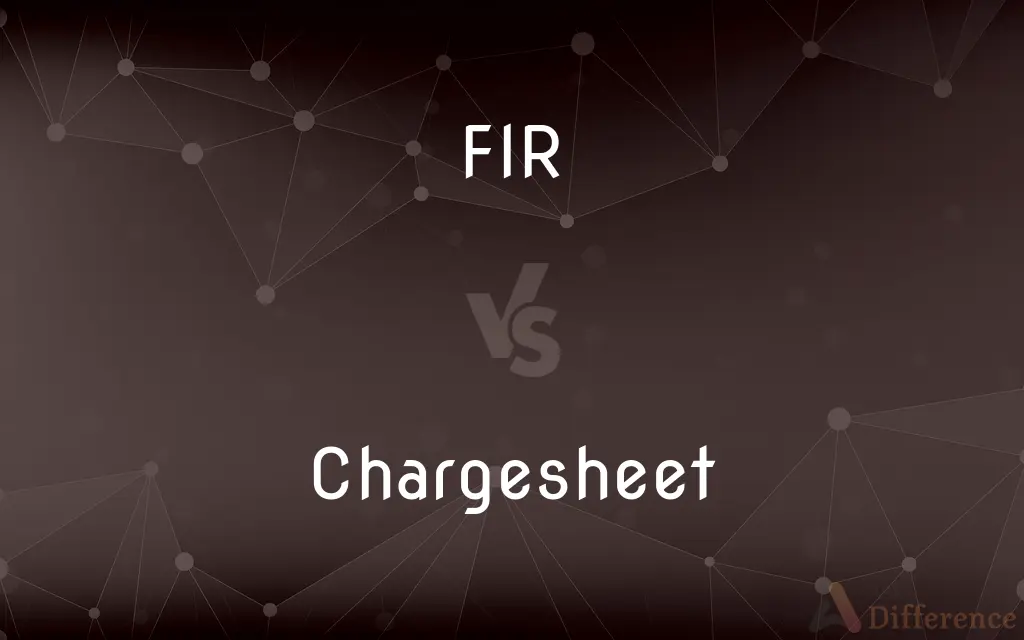FIR vs. Chargesheet — What's the Difference?
Edited by Tayyaba Rehman — By Fiza Rafique — Published on December 28, 2023
FIR (First Information Report) is the initial report on a crime. A Chargesheet is a formal police accusation after investigation.

Difference Between FIR and Chargesheet
Table of Contents
ADVERTISEMENT
Key Differences
An FIR, or First Information Report, is a preliminary document that is recorded by the police when they receive information about a crime. Conversely, a Chargesheet is a document presented by the police to a court, post their investigation, accusing a person of a crime.
The primary objective of an FIR is to initiate the investigation process. It captures the first narrative of the crime as told by the complainant. In contrast, the Chargesheet is a culmination of the investigation. It lists the evidence, the statements of witnesses, and establishes the crime's specifics.
Importantly, the FIR is recorded immediately upon receiving information about the crime, irrespective of the thoroughness of the details. On the other hand, the Chargesheet is only filed after the police believe they have gathered sufficient evidence to prove the accused's guilt in court.
While both the FIR and Chargesheet are pivotal in the criminal justice system, their roles are distinct. An FIR sets the legal process in motion, triggering an investigation. The Chargesheet, however, is the result of the investigation, paving the way for a trial.
In essence, while an FIR marks the beginning of legal proceedings, the Chargesheet is the next significant step, transitioning the case from investigation to trial, defining the accusations against the alleged perpetrators.
ADVERTISEMENT
Comparison Chart
Purpose
Initiates investigation
Formally accuses after investigation
Timing
Recorded immediately upon information
Filed after investigation completion
Contents
Initial details of crime
Evidence, witness statements, specifics of crime
Significance
Begins legal process
Leads to trial
Based on
Complainant's narrative
Outcome of police investigation
Compare with Definitions
FIR
Commencement of a legal inquiry into an offense.
An FIR was lodged, marking the start of the investigation.
Chargesheet
Culmination of the police's investigative findings.
The Chargesheet was substantial, encompassing several pages.
FIR
Initial documentation of a criminal incident.
The officer advised her to file an FIR for the missing items.
Chargesheet
Official police accusation post-investigation.
The police filed a Chargesheet against the main suspect.
FIR
The primary step in the criminal justice process.
After hearing about the assault, they rushed to record an FIR.
Chargesheet
The transition from investigation to court trial.
With the filing of the Chargesheet, the case proceeded to court.
FIR
The first official narrative of an alleged crime.
The police refused to alter the FIR once recorded.
Chargesheet
Formal listing of charges against an individual.
The Chargesheet clearly listed all allegations against the defendant.
FIR
Any of various evergreen trees of the genus Abies, having linear flattened needles and erect cones with deciduous scales.
Chargesheet
A document detailing evidence against the accused.
The lawyer examined the Chargesheet carefully before the trial.
FIR
Any of several similar or related trees, such as the Douglas fir.
Chargesheet
A document of accusation prepared by law enforcement to be submitted to the court.
FIR
The wood of any these trees.
Chargesheet
To prepare such a document of accusation against.
FIR
A conifer of the genus Abies.
FIR
Any pinaceous conifer of related genera, especially a Douglas fir (Pseudotsuga) or a Scots pine (Pinus sylvestris).
FIR
(uncountable) Wood of such trees.
FIR
A genus (Abies) of coniferous trees, often of large size and elegant shape, some of them valued for their timber and others for their resin. The species are distinguished as the balsam fir, the silver fir, the red fir, etc. The Scotch fir is a Pinus.
FIR
Nonresinous wood of a fir tree
FIR
Any of various evergreen trees of the genus Abies; chiefly of upland areas
FIR
Preliminary police report on a crime.
The victim immediately lodged an FIR after the theft.
Common Curiosities
Can an FIR be altered after recording?
No, once an FIR is recorded, it cannot be altered or changed.
What does FIR stand for?
FIR stands for First Information Report.
What is the primary purpose of a Chargesheet?
A Chargesheet formally accuses an individual post-investigation.
Is a Chargesheet always filed after an FIR?
Not always. A Chargesheet is filed if the police believe they have sufficient evidence post-investigation.
What does a Chargesheet typically contain?
A Chargesheet contains evidence, witness statements, and specifics of the crime.
Who can file an FIR?
Anyone with knowledge of a crime, whether a victim or witness, can file an FIR.
When should an FIR be recorded?
An FIR should be recorded immediately upon receiving information about a crime.
Can the police refuse to register an FIR?
Legally, the police shouldn't refuse an FIR, but instances of refusal have been reported, necessitating higher authority intervention.
Can legal proceedings start without an FIR?
An FIR is typically the first step, initiating the legal proceedings.
How soon after an FIR is a Chargesheet filed?
The time varies, but a Chargesheet is filed after the police complete their investigation.
Who files the Chargesheet in a court?
The police file the Chargesheet in a court after their investigation.
Can a case be dismissed based on its FIR?
No, an FIR only starts the legal process. Dismissal decisions occur during trial phases.
What if the Chargesheet is not filed in a stipulated time?
The accused might get bail if the Chargesheet isn't filed within the statutory time limit.
Does a Chargesheet guarantee a conviction?
No, a Chargesheet only lists accusations; the court decides guilt after a trial.
Are FIR and Chargesheet public documents?
Yes, both are public documents and can be accessed by the public under certain conditions.
Share Your Discovery

Previous Comparison
Selective Media vs. Differential Media
Next Comparison
Executive Director vs. Non-Executive DirectorAuthor Spotlight
Written by
Fiza RafiqueFiza Rafique is a skilled content writer at AskDifference.com, where she meticulously refines and enhances written pieces. Drawing from her vast editorial expertise, Fiza ensures clarity, accuracy, and precision in every article. Passionate about language, she continually seeks to elevate the quality of content for readers worldwide.
Edited by
Tayyaba RehmanTayyaba Rehman is a distinguished writer, currently serving as a primary contributor to askdifference.com. As a researcher in semantics and etymology, Tayyaba's passion for the complexity of languages and their distinctions has found a perfect home on the platform. Tayyaba delves into the intricacies of language, distinguishing between commonly confused words and phrases, thereby providing clarity for readers worldwide.













































